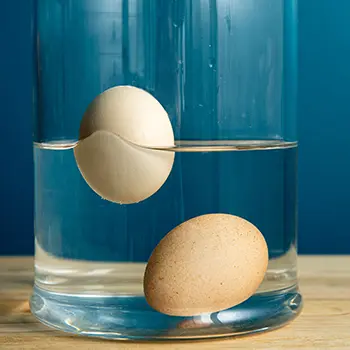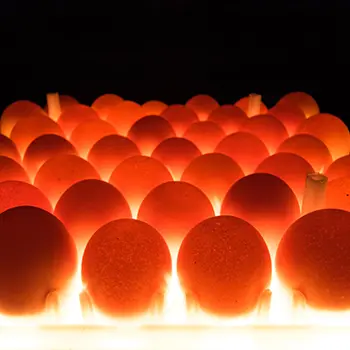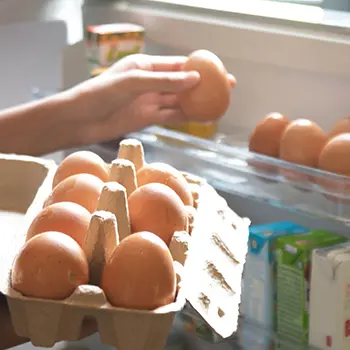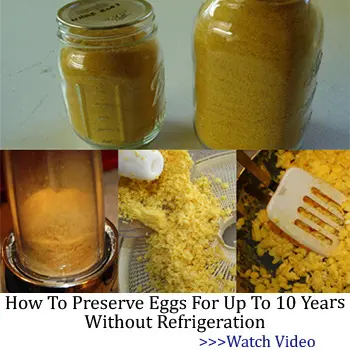Being able to spot spoiled eggs without cracking them open is a handy skill for homesteaders, survivalists, or anyone living off the grid. It helps you avoid wasting food, keeps your meals safe, and makes your eggs last longer.
But can you spot a spoiled egg without breaking its shell? I tried more techniques and I wanted to share them with you. Let’s begin!
The Water Test
To do the water test, begin by filling a bowl with water. Then gently place the egg into the water to observe its action.
Fresh eggs will sink and lay flat on their side at the bottom of the bowl. Eggs that are older but still edible will stand upright on the bottom. Spoiled eggs, on the other hand, will float to the surface, indicating that they are no longer safe to consume.
The Shake Test
To do the shake test, take the egg and hold it up close to your ear, ensuring it is near enough to detect any sound that may emanate from within.
Gently shake the egg several times, paying close attention to any movement or noise. The goal is to listen for a sloshing sound, which can indicate that the egg is no longer good for use.
If you shake the egg and don’t hear anything or just a faint sound, it’s probably fresh. But if you hear a sloshing noise inside, the egg is likely bad and shouldn’t be eaten.
Related: How to Keep Eggs Fresh for Months with Mineral Oil
Candling
To use the candling method, start by selecting a bright light source such as a flashlight, and find a dark room. Once you have your light source and room, hold the egg up to the light. This allows you to see inside the shell and determine the condition of the egg.
A fresh egg has a uniform yolk and white with a minimal air cell. In contrast, a spoiled egg will have a larger air cell and may show visible irregularities or dark spots.
Sniff Test
To do the sniff test, simply smell the egg through the shell. Yes, it’s that easy. By doing so, you can potentially detect any off-putting sulfurous or rotten odors that could indicate spoilage.
A fresh egg doesn’t have a noticeable odor, which indicates its safety for consumption. In contrast, a spoiled egg will give off a sulfurous or rotten smell and it’s not good to be consumed.
Checking the Shell
You need to look for a smooth, consistent texture without any cracks, sliminess, or powdery coating.
A fresh egg will have a smooth, consistent texture with no cracks present on the shell. On the other hand, a spoiled egg will show signs such as cracks, a slimy texture, or a powdery coating, indicating it is no longer safe to consume.
Related: How To Keep Eggs Fresh For 12+ Months
Ideal Storage Conditions
Ensure that eggs are kept in a cool, dry place to prolong their freshness. The ideal storage location should be away from direct sunlight, fluctuating temperatures, and excessive humidity.
Additionally, store eggs with the larger end facing upwards; this positioning helps maintain the stability of the air cell, which in turn preserves the egg’s quality and prolongs its shelf life.
Refrigeration Tips
When storing eggs in the refrigerator, it is important to place them in the main body of the unit rather than the door. The main body of the refrigerator maintains a more consistent temperature, which is essential for preserving the quality and freshness of your eggs.
The door tends to experience greater temperature fluctuations due to frequent opening and closing, which can compromise the eggs’ integrity and reduce their shelf life. Therefore, you should always store your eggs in the main section of the refrigerator to ensure they remain fresh and safe for consumption for a longer period.
Maximizing the shelf life of your eggs involves not only storing them properly but also being mindful of their neighbors in the refrigerator. Certain foods can help maintain their freshness, while others can accelerate spoilage.
Related: 20 Ways To Preserve Eggs
When considering foods to store next to your eggs, leafy greens, apples, and root vegetables are excellent choices. Leafy greens, such as spinach and lettuce, offer low odor and stable temperatures, making them ideal companions in your refrigerator space. Similarly, apples possess odor-neutral properties that help maintain the freshness of surrounding foods.
Root vegetables, including carrots, beets, and potatoes, stand out due to their low moisture content and reliable temperature stability, making them great neighbors to store alongside your eggs.
To ensure the long-term freshness and quality of your eggs, it is essential to be mindful of what you store alongside them. Avoid placing eggs near strong-smelling foods like onions, garlic, and certain cheeses, as these can permeate the eggshell and impart unwanted odors and flavors.
Additionally, keep high-moisture foods such as tomatoes, cucumbers, and melons away from your eggs to prevent moisture from promoting bacterial growth. Finally, steer clear of storing ethylene-producing fruits like bananas and avocados next to eggs, as the ethylene gas they release can accelerate spoilage. By following these guidelines, you can further ensure that your eggs remain fresh and safe for consumption.
Alternative Storage Methods
To extend the shelf life of your eggs, consider using alternative storage methods such as oil coating and water glassing.
Oil coating involves dipping the eggs in food-grade mineral oil to seal the pores, effectively slowing down the aging process and preventing bacteria from entering.
On the other hand, water glassing consists of storing the eggs in a solution of water and sodium silicate. This method creates a protective barrier around the eggs, preserving their freshness for an extended period.
Have you tried any of these methods? Which one worked best for you? Let us know!
How To Make The Invisible Root Cellar (Video)
10 Items You Should Stockpile Before The Next Great Depression

















